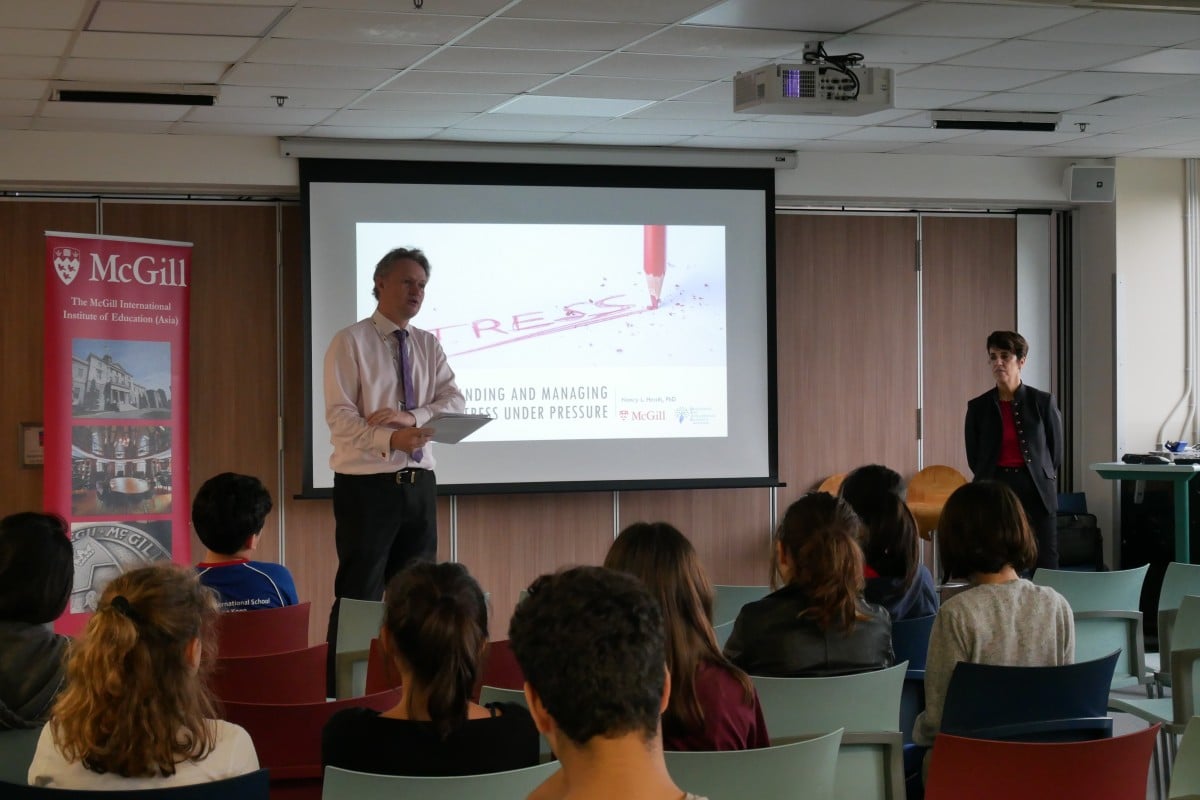
Campus Life: French International School students learn about the science of stress and how to manage the pressure of teen life
Learning to deal with a stress is just like any other skill – you just need the right tools, and a bit of practice
 Speakers from McGill University guide students through some simple stress-relieving techniques.
Speakers from McGill University guide students through some simple stress-relieving techniques. Stress – it’s all in your head. Of course, assignments, extra tuition classes, and exams, are all very real and can be overwhelming – but the way your body and brain respond to these external factors is actually something you can learn to control.
To understand more about what stress is, how to cope with it, and when it becomes too much, 30 students from French International School took part in a stress-management workshop last Friday.
As well as learning more about the science behind stress, the students had the chance to practise some physical and mental stress-relief techniques.
Don't let anxiety rule your life - it is possible to take back control
Young Post caught up with them after the workshop to find out what stresses them the most, and whether they feel the techniques they tried could work for them.
Like most of the participants that day, 12-year-old Jonathan Lo thought the source of his stress was external, and beyond his control.
“I always thought it was school tests that put pressure on me, when actually I’m the one who’s stressing myself out,” he told Young Post.
Too many choices can also lead to stress, so learn how to streamline your decision-making process
Now, when he catches himself being self-critical, Jonathan said he tries taking a deep breath and reasoning with himself as if he were talking to his best friend.
Kiam Karbassian, 13, said he signed up for the workshop because he didn’t know how to handle the pressure he feels to live up to his parents’ high expectations.
“It’s a relief to find out many of my peers also experience stress, and that there are so many ways to cope with it,” said the Year Nine student.
Unlike Jonathan, Kiam prefers using a method that doesn’t require active thinking or reasoning.
“I think splashing my face with cold water would be most helpful because it’s an easy physical action.”
Leading the workshop was Nancy Heath, a psychology professor from McGill University in Canada.
“The biggest misconception students have about stress is that it lies within events or exams, not realising it’s actually in what they think about these things,” she said. “Stress is something that you create in your head. It’s not inherent to the situation.”
Thirteen-year-old Charlotte Cretot recently switched from her school’s French stream to its international one, and she struggled to adjust to the new syllabus, especially in maths.
“Sometimes I had difficulty falling asleep,” she admitted.
Another physical way to ease stress is similar to an Ancient Chinese practice
After taking part in the workshop, though, the Year Eight student said she would definitely experiment with yoga nidra – a meditation and yoga technique which involves relaxing different parts of the body – to get a good night’s sleep.
For instant stress relievers that you can practise any time, anywhere, Heath recommends tensing and relaxing each muscle group one by one, and taking deep, calming breaths – inhaling through the nose for four slow counts, holding for two, then exhaling through the mouth for six counts.
“Muscle relaxation turns off your body’s stress response,” she said. “It doesn’t require any work, not even controlled breathing. So you can do it even if you’re really anxious.”
